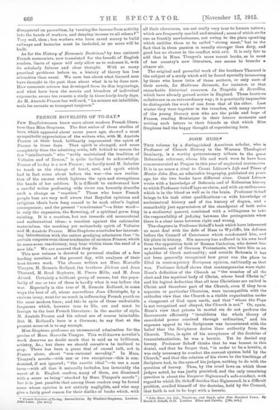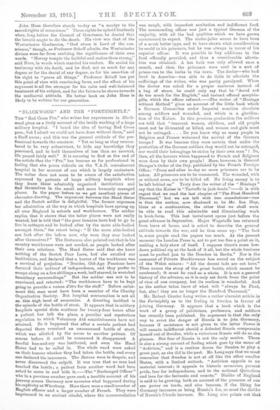JOHN HUSS.*
THIS volume by a distinguished American scholar, who is Professor of Church History in the Western Theological Seminary, is a worthy quincentenary tribute to the great Bohemian reformer, whose life and work were to have been commemorated at Prague in this year of neglected centenaries It is in no sense a rival to Count Liitzow'e Life and Times of Master John Hue, an admirable biography, published six years ago, for the two books have different aims. Count Liitzoie wrote with a. knowledge of Bohemia and of Bohemian history to which Professor Schaff lays no claim, and with ale enthusiasm which is in the blood as well as in the brain. Professor Seliaff brings to his task other qualifications—a wide knowledge of ecclesiastical history and of the history of dogma, and a remarkably just appreciation of the standpoint of both sides in a mediaeval quarrel, combined with a willingness to take the responsibility of judging between the protagonists when there is a clear issue between right and wrong.
The chapters in Professor Sobaff's book which have interested us most deal with the debt of Huss to Wycliffe, his defence before the Council of Constance which condemned him, and his place in history. His memory has suffered in his own land from the opposition both of Roman Catholics, who detest him as a heretic, and of German Protestants, who hate him as an upholder of Czech nationality; and outside Bohemia it has not been generally recognized how great was the place he filled in contemporary European opinion, unfriendly as that was. Professor Schaff shows that contemporaries were right. Huss's definition of the Church as "the number of all the elect and the mystical body of Christ, whose head Christ is," and his logical deduction that all true Christians are united in Christ and therefore part of the Church, even if they form separate or particular Churches, were incompatible with the orthodox view that the Church is a visible organization under a vicegerent of God upon earth, and that " where the Pope is not recognized and obeyed, the Church is not," Or, again. Huss's view that priests in mortal sin do not perform the Sacraments efficiently "invalidates the whole theory of sacerdotal power received through ordination," and his supreme appeal to the Scriptures was inconsistent with the belief that the Scriptures derive 'their authority from the Church. Thus, in spite of his acceptance of the doctrine of transubstantiation, he was a heretic. Yet he denied any heresy. Professor Schaff thinks that he was honest in this denial, and that he forgot that, " in order to be a heretic, it was only necessary to combat the current system held by the Church," and that the relation of his views to the teachings of Scripture had, in the eyes of his judges, nothing to do with the question of heresy. Thus, by the cruel laws on which these judges acted, be was justly punished, and the only remaining question is about the Emperor Sigismund's safe-conduct, with regard to which Dr. Schaff decides that Sigismund, in a difficult position, availed himself of the doctrine, held by the Council. that faith is not to be kept with a heretic.
• John lime: Me Life, Tesolii.ge, and Death, after Five /tundra Years. By David S. Schaff, D.D. London Allen: and Unw. [100. not.l
John Huss therefore stands to-day as " a martyr to the sacred rights of conscience." These rights he upheld fearlessly when, long before the Council of Constance, he denied that the heretic ought to die the death. His view was that of the Westminster Confession, " God alone is Lord of the con- science," though, as Professor Schaff admits, the Westminster divines were far from realizing the significance of their own words. "Heresy tempts the faithful and makes them strong," said Huss, in words which startled his readers. He sealed his testimony with his death, and he died, not so much for any dogma or for the denial of any dogma, as for his assertion of his right to "prove all things." Professor Schaff has put this point of view with convincing force, and the effect of his argument is all the stronger for his calm and well-balanced treatment of his subject, and for the fairness he shows towards the mediaeval attitude. No better book on John Huse is likely to be written for our generation.







































 Previous page
Previous page